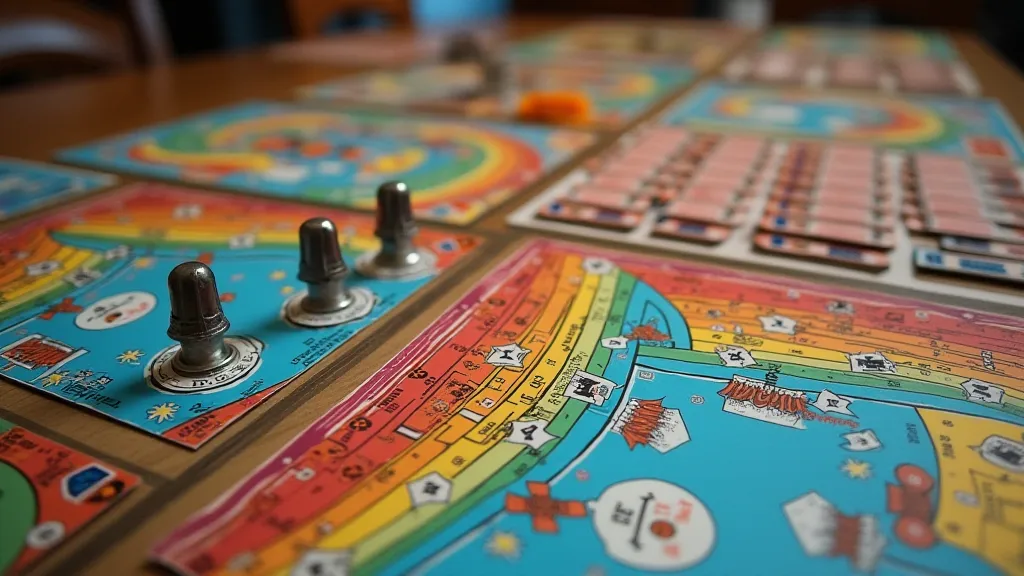Exploring Abstract Strategy: Games Like Chess and Go
Welcome to the fascinating world of abstract strategy games! Unlike games with a strong narrative or thematic elements, abstract strategy games focus purely on gameplay mechanics and strategic decision-making. They’re stripped down to their essential core, offering a challenging and intellectually stimulating experience. If you’re a fan of classics like chess and Go, or just looking for a board game that really puts your mental acuity to the test, then read on!
What Makes a Game "Abstract"?
The defining characteristic of an abstract strategy game is its lack of a narrative or theme. There are no characters, no story, no assigned roles. The focus is entirely on the rules and how players manipulate them to achieve a defined objective – usually, but not always, capturing pieces or occupying territory. The beauty lies in the elegance of the rules and the endless possibilities they generate. Think pure logic and calculated moves! Often, the design process prioritizes elegant rule sets and balanced gameplay, a concept that shares similarities to the thought process behind crafting compelling board game mechanics and the overall design philosophy you might find detailed in articles exploring the role of mechanics in shaping the experience.
The Titans: Chess and Go
Let's start with the heavyweights. Chess needs no introduction. Its complex interplay of piece movement and tactical combinations has captivated players for centuries. Mastering chess is a lifelong pursuit, and even experienced players constantly learn new strategies. The depth and replayability are simply unparalleled.

Go, originating in ancient China, presents a different kind of challenge. Instead of capturing pieces, the goal is to surround territory with your stones. The rules are remarkably simple to learn, but the strategic depth is immense. Unlike chess’s focus on direct attack, Go emphasizes long-term planning and positional advantage. It's a game of subtle influence and patient maneuvering. The inherent focus on balance and fair play within Go also relates to broader considerations when designing board games, as discussed in articles exploring the qualities that make for the best two-player experiences.
Beyond the Classics: Modern Abstract Gems
The world of abstract strategy isn't limited to the ancient greats. Many modern board games capture the same spirit of pure strategic thinking, offering innovative mechanics and engaging challenges.
- Santorini: A beautiful and deceptively simple game of building towers. Players move their builders up the towers, aiming to reach the third level. The catch? Blocking your opponents and using god powers adds a tactical layer.
- Azul: A tile-drafting game with stunning components. Players collect sets of tiles to decorate a palace wall. The blend of pattern recognition and tactical planning is highly addictive. The careful selection of materials and the focus on durable components, vital for longevity and aesthetic appeal, are elements worthy of consideration for any board game, aspects that are often discussed in detail when analyzing board game components.
- Quoridor: A clever game of maze construction. Players place fences to obstruct their opponents while simultaneously trying to reach the opposite side of the board.
- Hive: No board is required! This game uses hexagonal tiles, each representing an insect with unique movement abilities. The goal is to surround your opponent’s Queen Bee.

Why Play Abstract Strategy Games?
Abstract strategy games offer a unique set of benefits. They:
- Sharpen your mind: They require intense focus, planning, and problem-solving skills.
- Promote creativity: Finding novel solutions and outmaneuvering your opponent demands inventive thinking.
- Offer pure gameplay: No reliance on luck or thematic distractions; it’s just you versus your opponent.
- Provide endless replayability: The depth of strategy means you can play the same game countless times and still discover new nuances.
- Foster a sense of fair play: Many abstract games are meticulously designed to ensure balance and eliminate elements of chance, demanding strategic skill and calculated decisions from all players. This commitment to fair and engaging gameplay connects deeply with ethical considerations in game design, which some might find explored in greater depth when thinking about navigating the ethics of player agency.
The Psychology of Abstract Strategy
Beyond the purely mechanical aspects, abstract strategy games reveal fascinating insights into human cognition. The need to anticipate your opponent’s moves, to plan multiple steps ahead, and to adapt to unforeseen circumstances exercises crucial cognitive functions. Success in these games often depends on recognizing patterns, evaluating risk, and making optimal choices under pressure – skills that transfer readily to other areas of life. The mental fortitude required to persevere through challenging games is a testament to the human capacity for learning and adaptation.
Expanding Your Horizons: Hybrid Games
While we're focusing on purely abstract games, it's worth acknowledging the rise of hybrid games – titles that blend abstract mechanics with thematic elements. These games strive to offer the intellectual challenge of abstract strategy while also providing a compelling narrative or immersive experience. However, the balance between these two elements can be delicate, and many purists argue that the thematic layer can often detract from the purity of the strategic core. Whether you prefer the streamlined elegance of a purely abstract game or the richer experience of a hybrid title ultimately depends on your personal preferences.
Getting Started
Ready to dive in? If you’re new to the genre, Chess or Go are fantastic starting points, though they require a commitment to learning the rules and basic strategies. For something more accessible, Santorini or Azul are excellent choices. Don't be afraid to experiment and find a game that clicks with your preferred style of play! Consider exploring online resources and tutorials to familiarize yourself with the rules and basic strategies before gathering friends for a face-to-face showdown.

The Future of Abstract Strategy
The world of abstract strategy continues to evolve. Designers are constantly pushing the boundaries of what’s possible, experimenting with new mechanics and challenging traditional conventions. The rise of digital platforms has also opened up new avenues for innovation, allowing players to experience abstract games in entirely new ways. The development of AI opponents, for instance, provides a unique opportunity to test your skills against a formidable adversary. As technology continues to advance, we can expect even more exciting developments in the years to come.
Conclusion
Abstract strategy games offer a rewarding challenge for anyone seeking a pure and intellectually stimulating gaming experience. So, clear your mind, focus your thoughts, and prepare to engage in some truly fascinating strategic battles! The dedication and precision required in these games underscore a broader appreciation for thoughtful design and careful consideration in all facets of life – qualities we also admire when analyzing the intricacies of how board game mechanics shape narrative.





